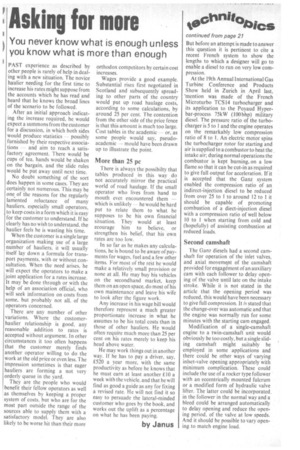Asking for more
Page 24

If you've noticed an error in this article please click here to report it so we can fix it.
You never know what is enough unless you know what is more than enough
PAST experience as described by other people is rarely of help in deal • ing with a new situation. The novice haulier needing for the first time to increase his rates might suppose from the accounts which he has read and heard that he knows the broad lines of the 'scenario to be followed.
After an initial approach indicating the increase required, he would expect a summons from the customer for a discussion, in which both sides would produce statistics possibly furnished by their respective associations -and aim to reach a satisfactory agreement. There would be cups of tea, hands would be shaken on the bargain, and the slide rules would be put away until next time.
No doubt something of the sort does happen in some cases. They are certainly not numerous. This may be one of the reasons for the regularly lamented reluctance of many hauliers, especially small operators, to keep costs in a form which it is easy for the customer to understand. If he clearly has no wish to understand, the haulier feels he is wasting his time.
When the customer is a single large organization making use of a large number of hauliers, it will usually itself lay down a formula for transport payments, with or without consultation. When the need arises, he will expect the operators to make a joint application for a rates increase. It may be done through or with the help of an association official, who will seek information on costs from some, but probably not all, of the operators concerned.
There are any number of other variations. Where the customerhaulier relationship is good, any reasonable addition to rates is accepted without argument. In other circumstances it too often happens that the customer merely finds another operator willing to do the work at the old price or even less. The impression sometimes is that eager hauliers are forming a not very orderly queue in the yard.
They are the people who would benefit their fellow operators as well as themselves by keeping a proper system of costs, but who are for the most part outside the range of the sources able to supply them with a satisfactory model. They are also likely to be worse hit than their more orthodox competitors by certain cost increases.
Wages provide a good example. Substantial rises first negotiated in Scotland and subsequently spreading to other parts of the country would put up road haulage costs, according to some calculations, by around 25 per cent. The contention from the other side of the price fence is that this amount is much too large.
Cost tables in the academic or, as some people would say, pseudoacademic — mould have been drawn up to illustrate the point.
More than 25 pc
There is always the possibilty that tables produced in this way do not accurately mirror the practical world of road haulage. If the small operator who lives from hand to mouth ever, encountered them — which is unlikely — he would be hard put to relate them to what he supposes to be his own financial situation. They would at least ecourage him to believe, or strengthen his belief, that his own rates are too low.
In so far as he makes any calculations, he is bound to be aware of payments for wages, fuel and, a few other items. For most of the rest he would make a relatively small provision or none at all. He may buy his vehicles on the secondhand market, keep them on an open space, do most of his own maintenance and leave his wife to look after the figure work.
Any increase in his wage bill would therefore represent a much greater proportionate increase in what he assumes to be his total costs than in those of other hauliers. He would often require much more than 25 per cent on his rates merely to keep his head above water.
He may work things out in another way. If he has to pay a driver, say, £520 a year more, with the same productivity as before he knows that he must earn at least another £10 a week with the vehicle, and that he will find as good a guide as any for fixing a revised rate. He will not find it so easy to persuade the lateral-minded customer who goes by the book, and works out the uplift as a percentage on what he has been paying.
by Janus




































































